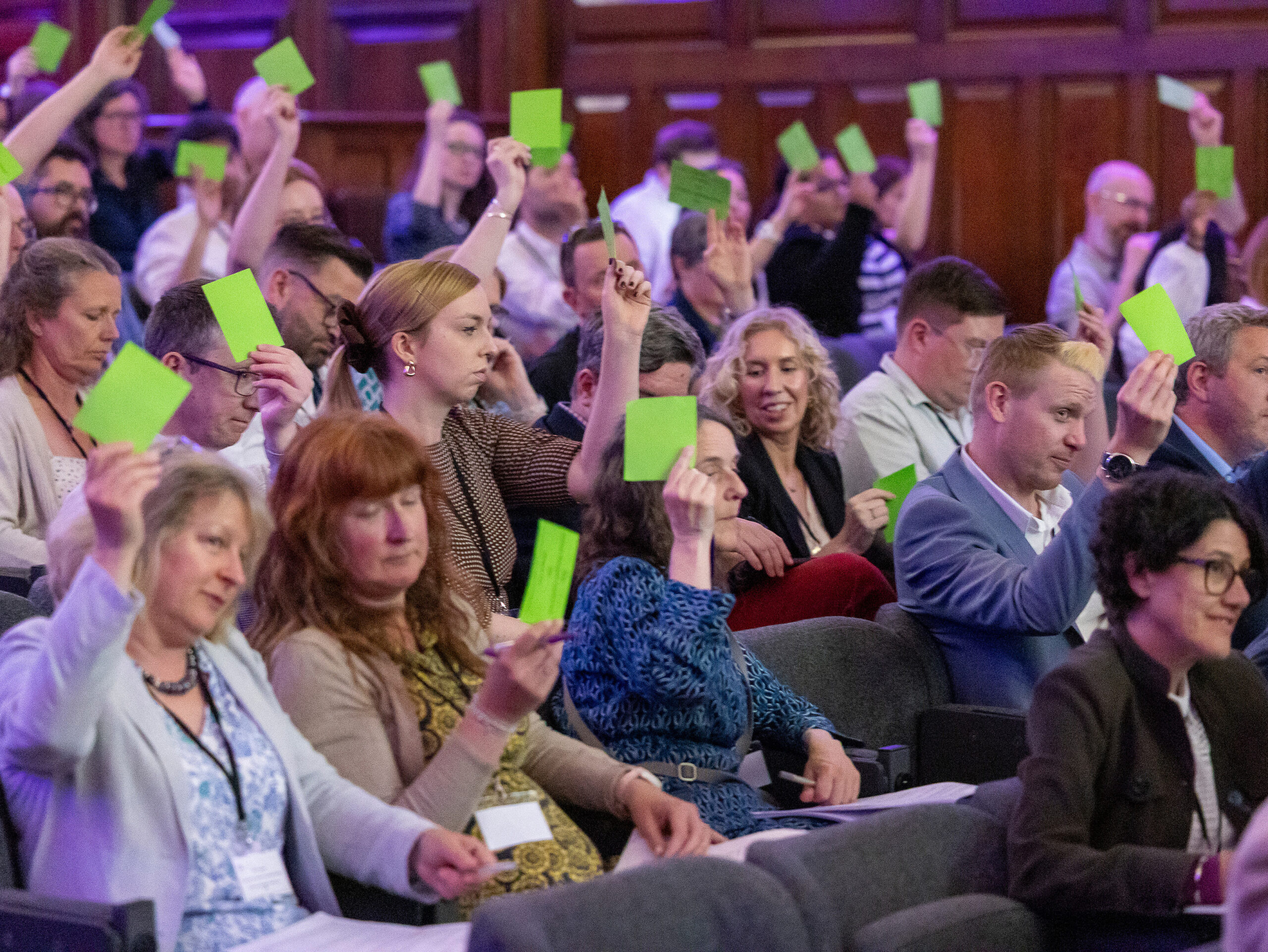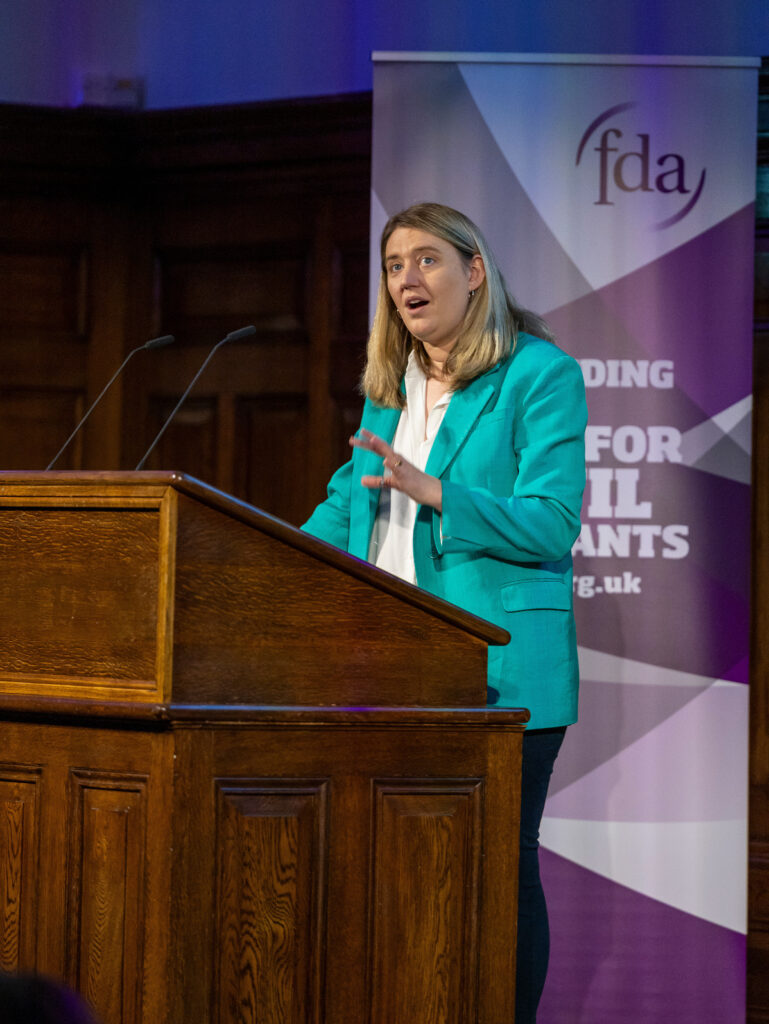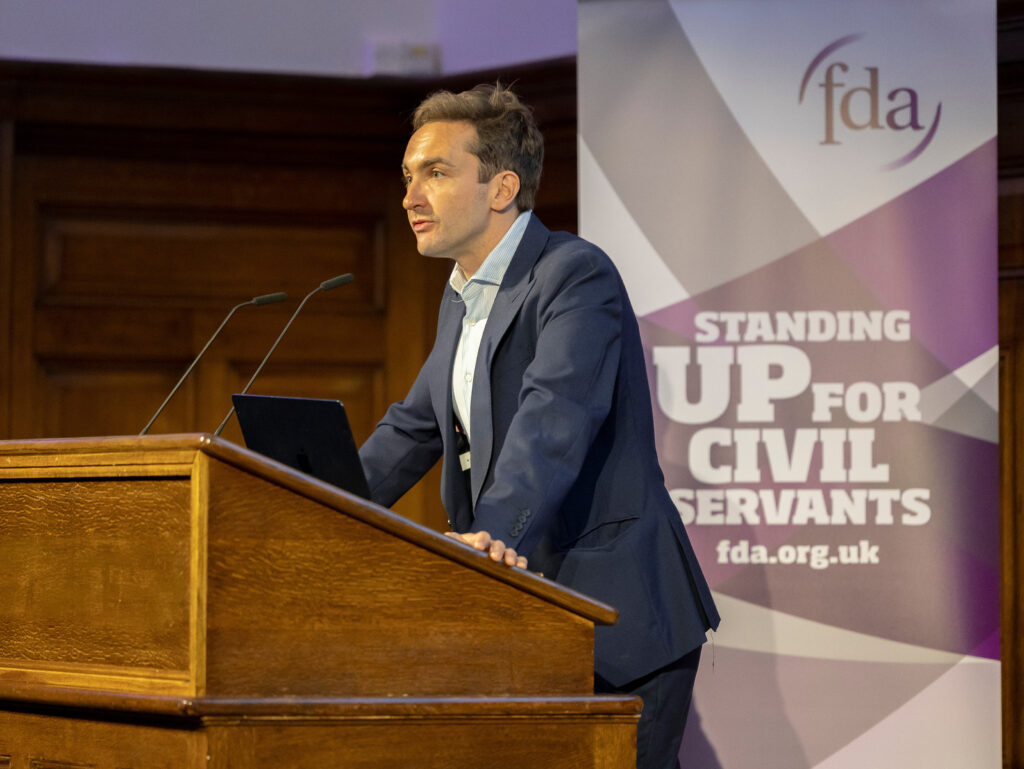The engine room of reform: speeches from ADC 2025

As well as lively debates on motions, the 2025 Annual Delegate Conference also heard from three main speakers: Parliamentary Secretary at the Cabinet Office Georgia Gould, FDA General Secretary Dave Penman, and journalist and broadcaster Lewis Goodall. Reports from Tom Nathan, Kay Hender and Tommy Newell.
Georgia Gould: “The FDA Is a source of advice, partnership and robust challenge.”
This year’s Annual Delegate Conference heard from Parliamentary Secretary at the Cabinet Office Georgia Gould. In this role, Gould works alongside the Chancellor of the Duchy of Lancaster Pat McFadden and has ministerial responsibility for public sector reform, oversight of government functions, and Cabinet Office business planning and performance.
Gould was appointed a minister just five days after being elected as a MP and started her address to delegates by saying a personal thank you to civil servants “for seamless transition… As a new MP I’ve been so grateful for the support, so much depth of knowledge on every issue”. She went on to thank the FDA as “a source of advice, partnership and… robust challenge” during her time in office.

Civil service reform
Gould’s address focused on how the government views civil servants’ roles in their plans to improve and reform public services, expressing the view that “civil servants choose these roles because you care about public service, but often feel frustrated about the system they work in, micro-management, not enough done in poor performance, basic things that can make it hard”, later adding “I believe we have brilliant people that are stuck in systems that don’t’ work, we need to change that… We need to make sure that civil servants are supported, [they] don’t always feel they have the mandate to do it”.
The minister set out her admiration for the history of the civil service, but outlined why this contributes to the government’s desire for reform: “The civil service is this amazing, historic institution… the professionalism, the depth of the values of impartiality and integrity, and I think these are deeply embedded because of its history. I also think some of that history means it has been set up for a slower, less complex and more hierarchical world. I think we can all probably feel that sometimes those structures do not feel fit to meet that new world… departments are far too siloed when all the challenges we face are deeply complex”.
Answering a question from a delegate on how she is learning from previous attempts to reform the civil service “to make sure what you are doing now makes a difference”, Gould responded that she is speaking to as many former ministers as possible, including both Labour and Conservative.
Gould added that she will also continue to speak to civil service trade unions, who “have seen a lot” and therefore can offer a different perspective on proposals.
The government’s plans for public service reform comes from what Gould refers to as “mission-led government”. She stated that these missions are “for the country and for all civil servants. We need to get behind you, ensure you have the proper training to see delivery in different contexts. Break down barriers between operational and delivery roles, remove processes and bureaucracy. Become much more seamless across departments. Some people have said they don’t want to put their head above the parapet because it’s not rewarded, that has to change”.
One delegate raised that, for many, reform and innovation requires trust and “that is not helped when government briefs against the civil service”.
Places for Growth
This year’s ADC took place the day after the government made significant announcements on the next stages of the Places for Growth programme and plans to move civil service jobs out of London. Gould told delegates: “London will continue to be the thriving centre, but we also want more progression opportunities. When I spoke to civil servants in those hubs they said they didn’t feel enough was being made of these opportunities, weren’t always working differently or testing new ideas, some said they felt further away and couldn’t progress unless in London”.
“For me it’s not just about the location, it’s a change in that approach. Not just making decisions in Whitehall but innovating together in the front line… We want a civil service that’s outward looking, creating partnerships and open to people from every background. We need to do more to make sure young people across the UK knows that the civil service is for them. Opportunity mission is about unleashing the talent in the country… They are valued, empowered and able to shape policy”.
During the Q&A session, Gould received a number of questions on the Places for Growth announcement, including how we can get to a position where someone can start and maintain a fulfilling civil service career all outside of London, whilst the ministers they serve remain in London. Responding to the first part of the question, Gould said the government are “expanding the school leaver apprenticeship to Birmingham, Manchester and hopefully beyond” and “have committed that half the Fast Stream places will be available outside of London and, critically, that half of senior civil servant roles should be out of London, so we can create that proper pathway and career progression that you have set out”.
“In terms of ministers, obviously we are accountable to parliament”, she continued, “ministers often need to be in London when parliament is sitting, but that does not mean we cannot spend time in the hubs… I have loved working alongside civil servants on the ground and seeing how we can work with universities and councils to bring that energy together. We want to make it easier for ministers to do that”.
Another delegate asked Gould about her claim that Places for Growth would see the civil service “looking to grow talent in all four corners of the UK”. The delegate suggested that the search was limited to some cities of the UK and that the arbitrary requirement for civil servants to attend the office 60% of the time may mean “we are going to lose a lot of people just because of that overcentralisation”.
On the government’s work‑from‑home policy, the Minister responded: “I know it is something that people feel very differently about. I think we feel that we have tried to get to a fair and balanced approach that gives people flexibility, but we think it is important that there are… when people come together and get the connections from working within a team”.
Equality, diversity and inclusion
Members were keen to raise the topic of equality in the civil service with the minister. One delegate raised that the summer diversity internship scheme which helped them to “get their foot in the door” no longer exists – it is now the summer internship scheme and the “diversity element is lost”.
When asked what the government is doing to support people from different ethnicities, genders, or socio-economic backgrounds to help ensure a more diverse workforce, Gould responded that she thinks it “so important that the civil service represents our country in every way, in terms of region, race and class background, because I think otherwise you just have blind spots in terms of your understanding of the country you are trying to represent. Certainly, my experience in local government is that having diverse teams genuinely saved lives. There were insights into communities that were disproportionately hit by Covid that we had within our teams at a senior level that meant we were able to respond before the data was even telling us things were a problem”.
On social mobility, Gould said she and the government “are working on how we how to take forward our social mobility strategy for the civil service. We mean ‘mobility’ in its broadest sense. I think your experiences and others’ experiences are really important within that. Clearly, the civil service is not diverse enough in so many different ways. There is a lot more we need to do”.
Dave Penman : The civil service is hungry for reform. The government needs to get on with it.”
In his speech to conference, FDA General Secretary Dave Penman rejected the idea that civil servants are resistant to change, arguing instead that “the civil service is hungry for reform” and challenging the government to simply “get on with it”.
Penman criticised the language used by the government to characterise its civil servants, stating that they “don’t get to decide the size of government, ministers do. They don’t create regulations or regulators to enforce them, ministers do.
“So, let’s cut out the language of a ‘bloated state’, of ‘blockers’ and ‘the usual suspects’.
“Civil servants can be the engine room of reform, they are hungry for it. But reform has to have substance. Being in government means it needs to be more than a buzzword in a speech. There has to be clear political objectives, a matching of resources to commitments and a plan.”

A clear plan
The FDA General Secretary challenged ministers to provide its civil service with “a clear plan for improved public services and a people plan to match”.
He said the government needs “a plan for what unlocking the digital and AI revolution can actually mean in reality. A plan for how services will be delivered differently, for how the civil service can attract, grow, and retain the right talent for the next decade, not simply be fixated with the staffing levels in the last one”.
Penman also lamented the pace of progress since Labour took power back last summer: “Civil service reform will take time to design, negotiate and implement, and all too soon ministers will be focusing on the next election. Almost 12 months in with the new government and we’re nowhere near the sort of discussion we need to be having, for that once in a generation reform that the civil service so badly needs. In this spending round it may not feel like the sun is shining, but we do now need to fix the roof.
“The new government has been given a once in a generation majority. It has set itself high ambitions and we all know that there is much to be done to improve public services. It needs a strong, skilled and motivated workforce to deliver them. That’s why we need to get on with it.”
Pay reform
The General Secretary also shared with delegates that “it’s been 30 years since civil service pay was last reformed. It’s inefficient, ineffective and it gives me no pleasure to say this, but for too long ministers have become comfortable in the tepid bath of managed decline when it comes to civil service pay. Always in the ‘too difficult’ pile whilst bemoaning the inability to recruit key skills or complaining about churn rates”.
Mentioning the FDA’s joint evidence with the Prospect union on how pay review bodies can deliver better outcomes over the longer term, Penman stated that “we firmly believe that a more robust, independent review body process could deliver the long-term decision-making needed, to provide departments with the ability to recruit and retain the skills needed for the next decade, as well as fairer outcomes for civil servants.”
Standards and ethics
While Penman welcomed “the Prime Minister’s rebranding of the Independent Adviser on Ministers’ Standards and that the adviser has the power to initiate investigations, all roads still lead back to the Prime Minister”, who still “has to decide on whether the code has been breached”.
Referring to the FDA seeking judicial review of the previous government’s plans to allow ministers to ignore interim measures handed down from the European Court of Human Rights, Penman added that “the last government deliberately fudged the issue, leaving civil servants unclear if there was a conflict between their professional obligations, and the instructions of ministers. No civil servant should be left in that position, and they should be able to call on the Civil Service Commission to act in real time with real enforcement powers.
“Labour promised to restore trust in politics and that now needs to be delivered… Independent, not self- regulation, is the key to restoring trust and enforcing standards – and regulators on standards and ethics need to have effective tools to enforce them.”
Lewis Goodall: “if there is no clear ideological sense of where a government is progressing, that makes delivery harder.”
Journalist and broadcaster Lewis Goodall, LBC presenter and co-host of the News Agents podcast alongside Emily Maitlis and Jon Sopel, gave conference his perspective on the first year of the new government.
He compared this Labour government with what he described as the “the geological eras of various different Conservative administrations that we went through” and said “it does feel very new”. However, as a Labour MP put it to him, “one in five days of this mandate, of this term, has already gone, nearly 20% of this administration is already gone” and, that first 20% “when the mandate is freshest, should be on paper, some of the most productive”.

Foreign vs domestic affairs
Contrasting the successes and challenges of this government, Goodall said it’s instructive to consider “the asymmetry with which Starmer is considered to handle the two fundamentals of his job: foreign affairs and domestic affairs”.
“When we think about foreign affairs, actually the write up is extremely credible, if not impressive,” he said. “There were reports even in the papers on Sunday of other foreign leaders, despite the fact that he’s only been there for 10 months, deferring to him, going to him for advice.”
He suggested this was in part because “it plays to Starmer’s strengths”.
“This is a field where the problems are obvious, where ideology is important but not that important, which is a matter of incremental gains. That is exactly the sort of politics, the sort of politician that Starmer is, right?”
Goodall said that the Prime Minister “eschews big ideas” and instead “likes to identify the problems and use what is at his disposal immediately to fix them”. He also suggested that Starmer “does not need to communicate in a flashy way” to other politicians, who are largely his audience when it comes to foreign affairs, and he “does not need to sell a grand narrative or a vision” to them either. However, Goodall feels this is exactly where Starmer’s government has struggled with domestic affairs.
“For that he needs the opposite. Yes, there are problems, but you have to identify what the problems are and sell what the solutions are to the electorate,” he explained.
The ‘threat’ of Reform UK
Contrasting this with the approach of Nigel Farage, whose party is reported to be surging in the polls, Goodall says “whatever you think of Nigel Farage, whatever you think of Reform, one thing you cannot say is that he is a man who lacks ideological ballast”.
He opined that what “ministers think is their salvation to the ‘Faragist’ threat is delivery” but questioned what delivery means in the 21st century – giving the example of Joe Biden’s administration struggling to communicate what had actually been delivered “when faced with a political opponent who is so good at consistently commanding, every single day, the narrative”.
Goodall told attendees that “if there is no clear ideological sense of where a government is progressing, then that in itself makes delivery harder”. He suggested “politicians who deliver” but “who don’t peddle in big ideas” will struggle in the current political climate, no matter “how good the people occupying those ministerial cars are”.
“This is just my view,” he said. “But you could be responsible, working in tandem with ministers for delivering a new hospital in every town, for filling every pothole and yet you, still, with the most effective Pied Piper of politics, will have many people who simply do not believe what is in front of them. That is difficult for any technocrat to believe. It is difficult for anyone who believes in good governance to credit. But it is in my view, correct.”
Debates on Annual Delegate Conference motions
Delegates debated 37 motions on a range of issues including pay, government policy, pensions, civil service employment matters and equality and diversity. Post conference, members received a link to version of the ADC Final Agenda containing details of which motions were passed, remitted and defeated, reflecting the FDA’s policy plans for the year ahead. This updated agenda can be accessed in the members’ area of the FDA website.
Each year the union also provides an update covering progress on motions passed at the previous ADC – the updates on 2024 motions can also be found in the FDA website members’ area. An update on developments from the motions passed at this year’s conference will be distributed later this year.
Latest news
-

NICS reform can only be delivered with political leadership, says FDA
The FDA has called for strong political leadership to address the structural issues facing the Northern Ireland Civil Service, in response to the NI Audit Office report, ‘Capacity and Capability: Follow Up Report’.
-

FDA Ofsted report 2025: The people behind inspections
After a barrage of media criticism and calls for abolition, it’s been a difficult period for His Majesty’s Inspectors (HMI). Tommy Newell outlines the findings of the FDA’s recent report, revealing the reality of parents’ and educators’ views of Ofsted, and what HMIs need for an inspection system fit for the future.
-
